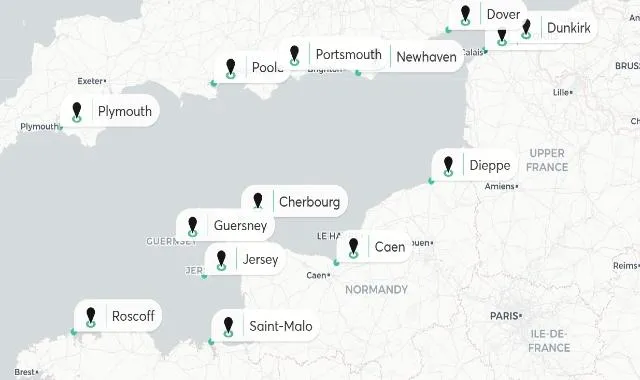Your Guide to Ferry Travel Between France and England
Whether you’re looking for a convenient way to cross the English Channel for a weekend getaway or a longer vacation abroad, ferry services provide a useful transportation option for traveling between France and England. In this article, I’ll explore the various ferry routes available, costs to expect, tips for smooth sailing, and more. By the end, you’ll have all the information you need to book your ferry with confidence.
Major Ferry Routes
There are several major ferry routes that connect ports in France with destinations in England. Here are the most popular options:
- Dover (UK) to Calais (France) – This is the busiest international seaway in the world, with multiple operators running ferries almost continuously throughout the day. It’s the quickest route, taking only about 1 hour each way.
- Portsmouth (UK) to Caen, Cherbourg or Le Havre (France) – Slightly longer crossings of 2-3 hours, these ferries sail from Portsmouth to ports in northern France.
- Newhaven (UK) to Dieppe (France) – At only about 2.5 hours each way, this route provides a convenient Channel crossing for travelers heading to or from continental Europe.
There are also less frequent ferry services connecting places like Poole in the UK to Cherbourg or St. Malo in France.
Choosing a Ferry Company
The major ferry operators for travel between France and the UK include P&O Ferries, DFDS, and Brittany Ferries. Each company sails various routes with different schedules, so it pays to shop around based on your travel dates and ports of departure/arrival. Here are a few tips when selecting a ferry company:
- Check schedules and sailing frequencies – Make sure the company has suitable departure/return times for your trip.
- Compare prices – Book early for the best rates. Promo fares are common, especially for advance purchases.
- Consider onboard amenities – Does the ferry have cafes/restaurants, lounges, WiFi access, etc.?
- Read reviews – Check if others have feedback on the company’s customer service or onboard experience.
Ferry Fares and Booking
How much you can expect to pay for a ferry between France and the UK really depends on factors like journey length, travel period, and class of accommodation. In general, here are some guidelines on ferry prices:

Short crossings (1-2 hours):
– Walk-on passenger fares start around £30-50 each way for a car and up to 4 passengers
– Book ahead fares from £50-100 return per vehicle depending on dates
Longer crossings (2.5-4 hours):
– Walk-on fares £70-120 each way for a car and passengers
– Advance purchase fares from £100-200 return for whole vehicle
It’s best to book well in advance whenever possible to secure the cheapest rates. Most major companies allow you to book tickets online or through a travel agent. Be sure to carefully check booking policies on cancellations or changes to your travel dates.
From my experience making ferry reservations between France and the UK, having some flexibility on your dates can save you a lot of money. I’ve found deals by keeping 2-3 days open on either side of my preferred travel dates. It’s also worth checking last-minute fare deals.
What to Expect on Board
Once aboard the ferry, here is generally what you can expect during the crossing:

- Check-in at least 30 minutes before scheduled departure time.
- Vehicle parking areas are clearly signed – arrive early to find best spaces.
- You can remain in your vehicle or leave it parked and explore onboard amenities.
- Cafes, shops, lounges and outdoor decks give you places to pass the time.
- WiFi access is available but speeds can be slow when busy.
- Crossings on longer routes may include a meal service in onboard restaurants.
- Announcements provide journey updates and instructions upon arrival.
Remember that motion sickness can potentially be an issue for some travelers, especially on rougher sea days. It’s a good idea to come prepared with any medications just in case!
Arriving in the UK or France
Once you disembark the ferry, here are some things you’ll likely encounter when reaching your destination country:
- Passport checks may be required depending on nationality – have IDs ready.
- Vehicles driving off will follow signs for customs declarations if needed.
- You can either continue your self-drive trip or make transportation arrangements.
- Taking the ferry during daytime hours avoids rushed overnight arrivals.
- Have route maps or directions handy for onward travel by car or public transit.
From past experience going through customs after ferry journeys, things generally move quickly if you have your documents in order. Be patient and you’ll be on your way in no time.
Final Thoughts
Whether you’re looking for a quick English Channel dart or a more leisurely ferry experience with onboard amenities, traveling by boat between France and the UK opens up fun travel opportunities on both sides. I hope this guide has provided helpful answers to all your questions about routes, companies, costs and what to expect.
Bon voyage and fair winds for your upcoming voyage across La Manche! Feel free to contact me if any other ferry travel questions come up before your trip.

Ferry Routes from France to England
| Port | Destination | Average Crossing Time | Vehicle Capacity | Daily Sailings |
|---|---|---|---|---|
| Calais | Dover | 1 hour 30 minutes | cars/coaches/freight | >20 |
| Caen | Portsmouth | 3 hours | 800 cars/130 coaches/freight | 2-4 |
| Roscoff | Plymouth | 4 hours | 450 cars/130 coaches/freight | 2-3 |
| Cherbourg | Poole | 4 hours | 700 cars/180 coaches/freight | 2 |
| Dieppe | Newhaven | 3 hours | 500 cars/130 coaches/freight | 2-3 |
FAQ
-
What are the main ferry routes from France to England?
Basically there are several ferry routes you can take from France to the UK. The most popular ones go from Calais to Dover, which is sort of the shortest sea crossing at around 1 hour. Ferries also go from Cherbourg, Roscoff and St Malo to Poole, Plymouth, and Portsmouth in England.
-
How long does the ferry journey from France to England typically take?
The journey times can vary a little depending on which exact route you take. But for the most common crossing from Calais to Dover, it usually takes around 1 to 1.5 hours. The longer routes from places like Cherbourg or Roscoff to southern English ports kind of take 2-3 hours.
-
What types of ferries operate between France and England?
Mostly there are two kinds – cargo ferries which primarily carry trucks and container ships, and passenger ferries designed for vehicles and people. The cargo ferries tend to be bigger ships that carry hundreds of trucks, whereas the passenger ferries have amenities like cafes, kids play areas and even cinemas aboard. Some ferries are wheelchair accessible too.
-
How do I book ferry tickets from France to the UK?
You can book ferry tickets online directly from the different operators’ websites like DFDS and Brittany Ferries. It’s usually best to book in advance during summer season, as tickets may sell out. Most operators let you modify or cancel bookings for a fee if your travel plans change. Some even have last minute fare deals. Booking online is easiest and you’ll get e-tickets.
-
What documents will I need for ferry travel between France and England?
For ferry travel within the European Union, you’ll principally need some form of photo ID like a passport or national ID card. You may also need stuff like travel documents for your vehicle. But is that really fair if you’re just traveling within the EU? Maybe the rules are a bit strict. Make sure to check the operator websites or give them a call for any specific document requirements.

-
How much does ferry travel from France to the UK typically cost?
Ferry ticket prices can vary depending on factors like time of travel, type of cabin or seating, vehicle size and season. However, as a rough guide, expect to pay anywhere from £50 to £150 per passenger for a standard return trip. Book in advance and you may find deals for significantly less. Traveling as a foot passenger is usually the most budget-friendly option if you don’t need transport for a vehicle.
-
What are the advantages and disadvantages of ferry travel versus the Channel Tunnel?
While the Channel Tunnel by Eurotunnel allows you to drive your vehicle right onto a train, ferry crossings give you breathtaking views of the coastlines. Plus some travelers find the open sea journey more relaxing than being in an enclosed train. Although on the other hand, the Eurotunnel takes only 35 minutes versus 1-3 hours on a ferry. And it operates throughout the day and night unlike ferry schedules. So there are pros and cons to weigh!
